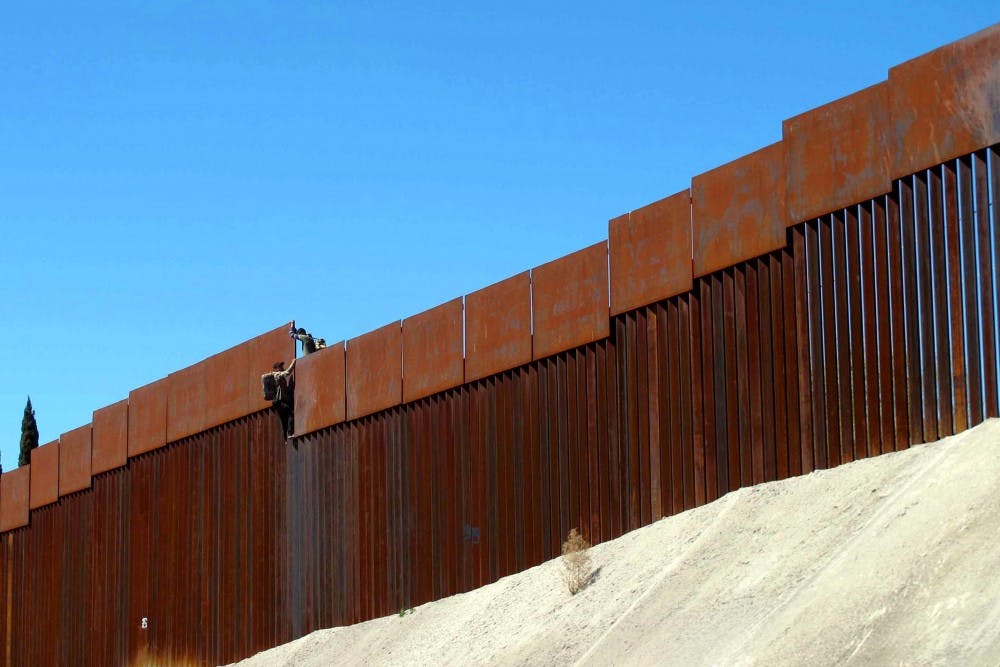Donald Trump and Ted Cruz are vastly underestimating the abilities of immigrants from South America and Central America to cross the border illegally. The presidential candidates' proposals to build a wall across the border are preposterous because they do not attack the root causes of why people and drugs are making their way to U.S. and the proposals would not fix the other ways illegal immigrants are crossing the border.
One common way illegal immigrants come to U.S. is by obtaining an immigrant visa and crossing legally at first, but then overstaying their visa once they are here. Effectively categorizing them as illegal immigrants. Many of those immigrants obtain either a work visa or student visa that grants them legal admission into the country, but they never renew it or go back to their country of origin. They stay and build new lives for themselves in America.
Marc Rosenblum at the Migration Policy Institute noted that "overstays represent about 16 percent of unauthorized Mexican immigrants, about 27 percent of unauthorized Central Americans, and about 91 percent of all other unauthorized immigrants." The visa system needs some revising if we really want to keep illegal immigrants out of the country.
Furthermore, a wall would only provide a temporary fix, if at all, because of the fact that it could just be tunneled under. We witnessed this ability in October 2015 when a tunnel between warehouses in Tijuana and San Diego were raided. The tunneled stretched "eight football fields and had a rail system, lighting, electricity and metal beams to prevent a cave in."
The wall proposal from Trump and Cruz purely serves as a temporary fix to a porous border. It does not get to the real problem of why hundreds of thousands of people have immigrated illegally. First and foremost the underlying reason is money. The United States is flooded with marijuana, cocaine, methamphetamine and other drugs that are brought in from the cartels south of the border.
Secondly, there are very few opportunities for the small villages and towns outside of the big cities in Central America and South America. People coming from these rural towns have sparse job opportunities and nothing close to "the land of opportunity" here in America. They see no other choice than to risk their lives coming to the United States in search of work.
Finally, cartels and other organized crime syndicates have a stranglehold on border-towns, often perpetrating mass kidnappings for ransom along with other forms of organized crime. The cartel's actions effectively terrorize the citizens who then try to cross the border to escape living in fear.
If we want to keep people and drugs from illegally crossing the border we must cap the abilities of cartels to bring drugs into the U.S. We can do this by beginning more undercover investigations into the practices of drug smugglers along with strengthening drug use prevention in the U.S. We also need to create opportunities for smaller towns and villages around Mexico and South American countries so they have no need to work in the U.S. Lastly, we must begin to develop a long-term plan with help from our allies to weaken the dangerous and intelligent cartels and eventually eliminate them.
These problems are no small feats to overcome, but it would be a better use of our time, money and effort to attack the root causes of the problems rather than just build a multi-billion dollar wall and say they are over.
Let's fix why illegal immigrants and drugs are coming, not just stop them from getting here.
Related Links:
Donald Trump relies on misinformation to trick gullible voters
Immigrants will give Arizona economy billions
Reach the columnist at Graham.Paul@asu.edu or follow @GrahamASUpress on Twitter.
Editor’s note: The opinions presented in this column are the author’s and do not imply any endorsement from The State Press or its editors.
Want to join the conversation? Send an email to opiniondesk.statepress@gmail.com. Keep letters under 300 words and be sure to include your university affiliation. Anonymity will not be granted.
Like The State Press on Facebook and follow @statepress on Twitter.




